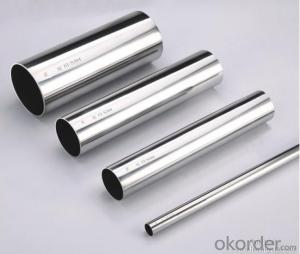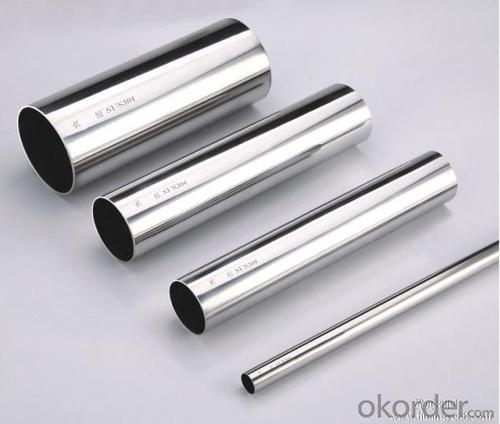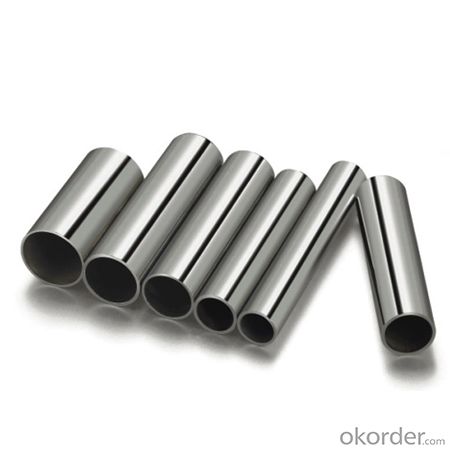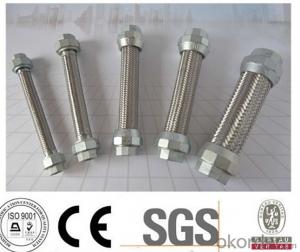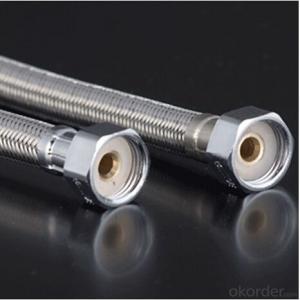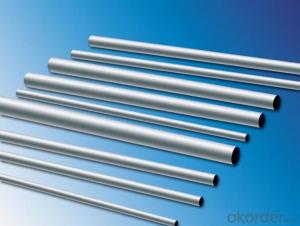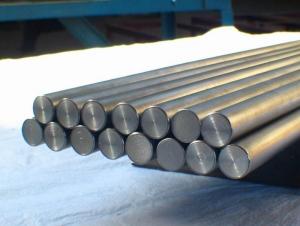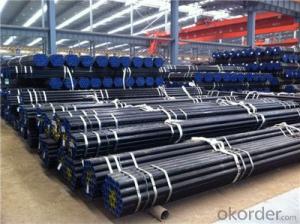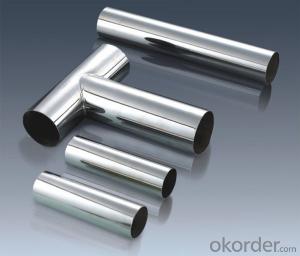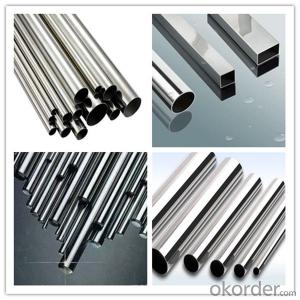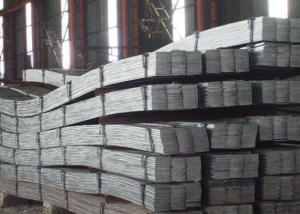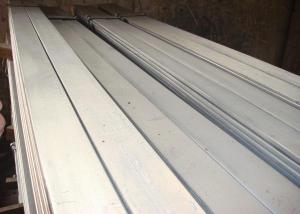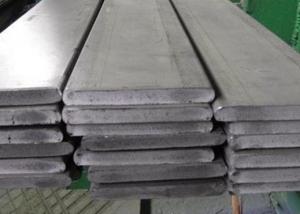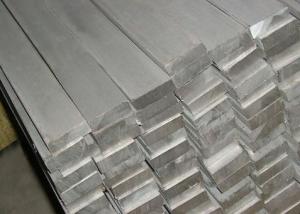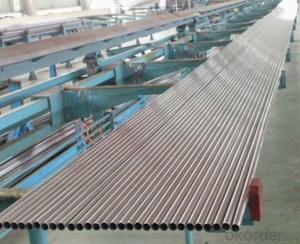304 Stainless Steel Pipe Clamp with low price
- Loading Port:
- Tianjin
- Payment Terms:
- TT OR LC
- Min Order Qty:
- 35 m.t
- Supply Capability:
- 5000 m.t/month
OKorder Service Pledge
OKorder Financial Service
You Might Also Like
Specification
Structure :
Seamless pipe is formed by drawing a solid billet over a piercing rod to create the hollow shell. As the manufacturing process does not include any welding, seamless pipes are perceived to be stronger and more reliable. Historically seamless pipe was regarded as withstanding pressure better than other types, and was often more easily available than welded pipe.
Main Features :
• High manufacturing accuracy
• High strength
• Small inertia resistance
• Strong heat dissipation ability
• Good visual effect
• Reasonable price
FAQ :
A. How is the quality of your products?
Our products are manufactured strictly according to national and internaional standard, and we take a test on every pipe before delivered out. If you want see our quality certifications and all kinds of testing report, please just ask us for it.
Guaranteed: If products’ quality don’t accord to discription as we give or the promise before you place order, we promise 100% refund.
B. How about price?
Yes, we are factory and be able to give you lowest price below market one, and we have a policy that “ for saving time and absolutely honest business attitude, we quote as lowest as possible for any customer, and discount can be given according to quantity”,if you like bargain and factory price is not low enough as you think, just don’t waste your time.Please trust the quotation we would give you, it is professional one.
C.Why should you chose us?
Chose happens because of quality, then price, We can give you both.Additionally, we can also offer professional products inquiry, products knowledge train(for agents), smooth goods delivery, exellent customer solution proposals.Our service formula: good quality+good price+good service=customer’s trust
SGS test is available, customer inspection before shipping is welcome, third party inspection is no problem.
Any question, pls feel free to contact us !
Product image:
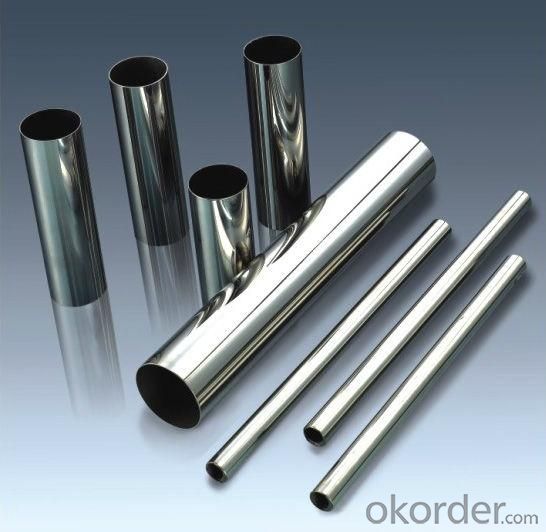
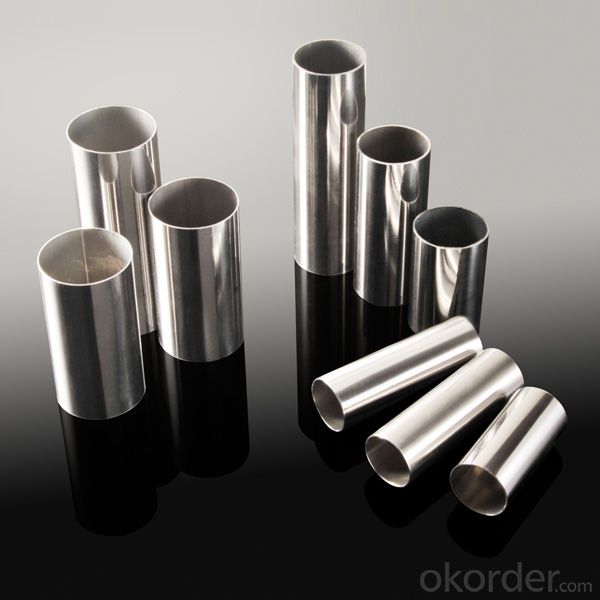
Company Information:
CNBM International Corporation (CNBM International) is the most important trading platform of CNBM Group Corporation, a state-owned company under the direct supervision of State-owned Assets Supervision and Administration Commission of the State Council.
Since 2004, the trading volume of CNBM International has been doubled in 5 successive years owing to the support of superior corporations and effort of all staff. Meanwhile, we have established strategic partnerships with hundreds of domestic manufacturers and sound business relations with clients from over 120 countries. Currently, we have wholly-owned overseas subsidiaries and branches in 5 countries with a view to realize localization, which also represents an essential progress in our globalization target.
- Q: How much more expensive is 304 stainless steel than 201?
- 201 in the stainless steel industry, represents a kind of material, 201 stainless steel is generally refers to 201 stainless steel and acid resistant steel floorboard. 201 stainless steel refers to the atmosphere, steam, water and other weak medium corrosion of steel, while acid resistant steel refers to acid, alkali, salt and other chemical corrosive medium corrosion of steel.
- Q: How do you calculate the expansion of stainless steel pipes?
- In order to calculate the expansion of stainless steel pipes, it is necessary to take into account the coefficient of thermal expansion (CTE) of the material. The CTE quantifies the extent to which a material expands or contracts when exposed to temperature changes. To begin, the initial length of the stainless steel pipe must be determined. This refers to the length of the pipe at the starting temperature. Subsequently, the final operating temperature of the pipe needs to be established. This denotes the temperature at which the expansion is desired to be calculated. The CTE value for the specific grade of stainless steel used in the pipe must be obtained. The CTE is typically expressed in units of per degree Celsius (or per degree Fahrenheit). Multiply the initial length of the pipe by the CTE value and then multiply it by the change in temperature. This computation yields the expansion or contraction of the pipe within the given temperature range. For instance, assume a stainless steel pipe with an initial length of 10 meters, a CTE of 17 x 10^-6 per degree Celsius, and a desired expansion calculation at a final temperature of 100 degrees Celsius. The change in temperature is determined by subtracting the initial temperature from the final temperature. Expansion = Initial Length * CTE * Change in Temperature Expansion = 10 meters * 17 x 10^-6 per degree Celsius * 100 degrees Celsius Expansion = 0.0017 meters or 1.7 millimeters Consequently, when subjected to a temperature increase of 100 degrees Celsius, the stainless steel pipe would expand by 1.7 millimeters. It is important to note that this calculation assumes a uniform expansion throughout the entire length of the pipe. In reality, thermal expansion may vary due to factors such as pipe diameter, wall thickness, and other structural considerations. Thus, it is advisable to consult industry standards or engineering references for more precise calculations in specific applications.
- Q: Can stainless steel pipes be used for water treatment plants?
- Yes, stainless steel pipes can be used for water treatment plants. Stainless steel pipes offer several advantages for water treatment applications. Firstly, stainless steel is highly resistant to corrosion, which is crucial in environments where water and chemicals are in constant contact with the pipes. Corrosion resistance ensures the longevity and durability of the pipes, minimizing maintenance and replacement costs. Additionally, stainless steel pipes have excellent hygienic properties. They are non-porous, which means they do not absorb or retain contaminants, ensuring that the water remains clean and uncontaminated during the treatment process. This makes stainless steel pipes suitable for applications that require high levels of cleanliness and purity, such as water treatment plants. Moreover, stainless steel pipes are known for their strength and reliability. They can withstand high pressures and temperature variations, making them suitable for the demanding conditions often found in water treatment plants. Stainless steel pipes also have good mechanical properties, such as high tensile strength and impact resistance, which further contribute to their suitability for water treatment applications. In summary, stainless steel pipes are an excellent choice for water treatment plants due to their corrosion resistance, hygienic properties, and strength. They provide a long-lasting, reliable, and clean solution for transporting water and chemicals in the treatment process.
- Q: Can stainless steel pipes be used for food processing equipment?
- Yes, stainless steel pipes can be used for food processing equipment. Stainless steel is a preferred material for food processing due to its corrosion resistance, easy cleaning, and durability. It is also non-reactive, ensuring that it does not contaminate the food being processed.
- Q: What is the difference between 304F and 316F stainless steel pipes?
- The main difference between 304F and 316F stainless steel pipes lies in their chemical composition and corrosion resistance properties. 304F stainless steel contains a higher percentage of chromium (18-20%) and nickel (8-10.5%), which provides good corrosion resistance in mildly corrosive environments. On the other hand, 316F stainless steel has a higher percentage of chromium (16-18%), nickel (10-14%), and molybdenum (2-3%), making it more resistant to corrosion, particularly in chloride-rich environments. Therefore, 316F stainless steel pipes are generally preferred in more corrosive and marine applications.
- Q: Can stainless steel pipes be insulated with polypropylene?
- Yes, stainless steel pipes can be insulated with polypropylene. Polypropylene is a commonly used material for pipe insulation due to its excellent thermal properties and low thermal conductivity. It is resistant to moisture, chemicals, and UV radiation, making it suitable for a variety of applications. Polypropylene insulation can help prevent heat loss or gain in stainless steel pipes, improving energy efficiency and reducing the risk of condensation or freezing. It is important to ensure that the polypropylene insulation is properly installed and compatible with the specific stainless steel pipe to ensure optimal performance and longevity.
- Q: What are the specifications of stainless steel decorative pipes?
- The steel pipe seamless steel pipe and welded steel pipe (seamed pipe) two categories. It can be divided into round tube and special-shaped tube according to the sectional shape. The round steel tube is widely used, but there are some special-shaped steel tubes such as square, rectangle, semicircle, hexagon, equilateral triangle and octagon.
- Q: Are stainless steel pipes suitable for extreme weather conditions?
- Yes, stainless steel pipes are highly suitable for extreme weather conditions. Stainless steel is known for its exceptional resistance to corrosion, making it ideal for withstanding harsh weather conditions such as extreme temperatures, heavy rain, and high humidity. Additionally, stainless steel pipes have excellent strength and durability, allowing them to withstand the impact of strong winds, storms, and other extreme weather events. Moreover, stainless steel is not affected by UV radiation, so it will not degrade or discolor when exposed to intense sunlight. Overall, stainless steel pipes are a reliable and long-lasting option for any application that requires resistance to extreme weather conditions.
- Q: What is the standard size range for stainless steel pipes?
- The stainless steel pipe size range varies depending on the industry and application it is being used for. Generally speaking, stainless steel pipes come in a wide array of sizes. They can start from small diameters, measuring about 0.5 inches (12.7 mm), and go all the way up to large diameters of 48 inches (1219 mm) or even larger in certain cases. The wall thickness of these pipes can also differ, ranging from thin-walled pipes with a few millimeters thickness to heavy-walled pipes with thicknesses exceeding an inch. Determining the specific size range for stainless steel pipes depends on factors like the intended use, pressure requirements, and adherence to industry standards. It is crucial to consult relevant specifications and standards to accurately ascertain the appropriate size range for a given application.
- Q: Can stainless steel pipes be used for desalination plants?
- Stainless steel pipes are indeed applicable for desalination plants. Given its remarkable resistance to corrosion, stainless steel proves to be an appropriate material for desalination plants dealing with water that contains elevated levels of salt and other corrosive substances. The exceptional corrosion resistance of stainless steel pipes inhibits the accumulation of scale and the occurrence of rust, thus assuring the long-lasting and efficient operation of the desalination plant. Furthermore, stainless steel pipes are renowned for their robustness and endurance, making them capable of withstanding the demanding conditions of high pressure and temperature frequently encountered in desalination plants. All in all, stainless steel pipes are an optimal choice for desalination plants owing to their resistance to corrosion, strength, and durability.
Send your message to us
304 Stainless Steel Pipe Clamp with low price
- Loading Port:
- Tianjin
- Payment Terms:
- TT OR LC
- Min Order Qty:
- 35 m.t
- Supply Capability:
- 5000 m.t/month
OKorder Service Pledge
OKorder Financial Service
Similar products
Hot products
Hot Searches
Related keywords
